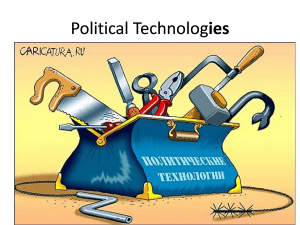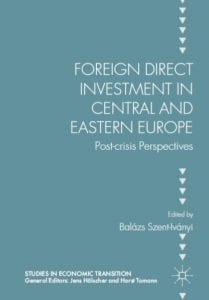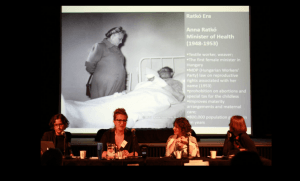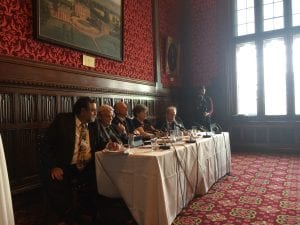Pot Calls the Kettle Black: Russian Report Describes the Spread of ‘Modern Technological Populism’
By Lisa J Walters, on 16 June 2017
Prof Andrew Wilson, Professor of Ukrainian Studies
When it comes to political dirty tricks, you can rely on the Russians to know how to call things by their right name. Russians also have the habit of using terminology to describe the wider world that is reflexively useful for conceptualising Russia itself. A recent Report by a new Russian think-tank on ‘Modern Technological Populism’ has therefore caused quite a stir; both because Russia has been accused of not-so-covert support for populists like Donald Trump and Marine LePen, and because the Report is the first product of an institution directly linked to the Kremlin.
The think-tank in question is the ‘Expert Institute of Social Research’ (which in Russian has the acronym EISI), founded in the autumn of 2016 and launched in March 2017. The EISI is attached to the Presidential Administration and is presumed to reflect the thinking of the new Kremlin propaganda chief, former Prime Minister Sergei Kirienko and his ‘Strategy 2030’.
Beyond Fake News: How Trump’s Disruptive Technology Mirrors Russian Political Technology
By Lisa J Walters, on 13 June 2017
Prof Andrew Wilson, Professor of Ukrainian Studies
The investigation into the Trump campaign’s links with Russia has already uncovered many layers and levels. More will no doubt be found; but the search would be assisted by a better understanding of just what has gone on in Russia these last twenty years. Hacking may have generated the most lurid headlines, but is just one of many techniques in the arsenal of what Russians call ‘political technology’. And the West needs to take a closer look at itself – the U.S. election was simply the most dramatic example yet of the consequences of the dangerous combination of political technology with ‘disruptive technology’.
Brexit and FDI: Facts Checked
By Lisa J Walters, on 7 June 2017
Dr Randolph Bruno, Senior Lecturer in Economics
The BREXIT debate, that we see unfolding within the UK parliament, the European Parliament, the media, British as well as international news outlets and more generally in public speeches on the campaign trail, is in many ways bewildering. It is in particular surprising that despite its importance it is very difficult to understand where each and every politician really stands on the issue of Brexit (e.g. http://www.bbc.co.uk/news/av/uk-politics-40088892/jeremy-paxman-grills-theresa-may-and-jeremy-corbyn). Negotiations strategies and possible outcomes remains very difficult to predict, as do the impact of the process on future relations with the EU . The confusion is further worsened by the circulation of alternative facts on social media, which may be contributing to a polarisation of views in society. The recent increase in hate crimes after the referendum is possibly one of the most worrying symptoms of these exacerbated social tensions.
A Polish family in Plymouth received what police described as a “hate-filled” letter.
Post-Crisis Perspectives on Foreign Direct Investment in Central and Eastern Europe
By Lisa J Walters, on 26 May 2017
Balázs Szent-Iványi (Aston, Centre for Europe)
The Centre for the Comparative Studies of Emerging Economies organised an afternoon round-table at UCL’s School of Slavonic and East European Studies on 25 April 2017 to launch a book, FDI in Central and Eastern Europe – Post-Crisis Perspectives (Palgrave 2017), edited by Balazs Szent-Ivanyi, Aston University in Birmingham. The event was organised with financial support from SSEES, the UCL European Institute and the Centre for Europe, Aston University. Professor Tomasz Mickiewicz (Aston Business School, previous SSEES), Professor Slavo Radosevic (UCL, SSEES) and Dr Randolph Bruno (UCL, SSEES) took part in this event.
Reproductive Justice and Discourses of Childbearing in the Fringes of Europe: Ongoing Discussions with SSEES and Partner Researchers and Activists
By Lisa J Walters, on 19 May 2017
Dr Nevila Pahumi, Alexander Nash Fellowship in Albanian Studies
Over the past year, a group of us SSEES researchers have actively engaged questions of reproductive justice and discourses of childbearing in Eastern and Western Europe. Given the commonality of challenges women face in both ends of the continent to practice reproductive choice over their bodies, we have joined forces to give voice to some of the key concerns behind pro-choice and reproductive justice abortion debates now raging across the continent and beyond.
Eurovision Comes to Kyiv, Ukraine Gets Three-Quarters of the Way to Europe
By Lisa J Walters, on 17 May 2017
Prof Andrew Wilson, Professor of Ukrainian Studies
I am in Kyiv for the Eurovision Song Contest final. All marvellous fun, though I have done some work too. Ukraine has embraced the official slogan ‘Celebrate Diversity’ with apparent ease; not least because it is the perfect symbol for the new Ukraine and its European aspirations – multi-ethnic, multi-lingual, multi-confessional and tolerant.
Why did the Soviet Union collapse?
By Lisa J Walters, on 20 April 2017
Prof Alena Ledeneva, Professor of Politics and Society
The Soviet Union collapsed more than quarter of a century ago and since then many people have offered their own interpretations of the event. Most of them are valid, but none of them could fully embrace the complexity of the phenomenon and we still do not have a comprehensive account of why the largest country in the world disintegrated, and what the consequences of this were.
Belarus: Fraying Social Contract Puts Protestors on the Streets
By Lisa J Walters, on 5 April 2017
Prof Andrew Wilson, Professor of Ukrainian Studies
I have just got back from a few days in Minsk, where events are moving fast. First was an unprecedented wave of demonstrations that began on 17 February. Belarus is used to a largely ritualistic cycle of impotent political protest from the ‘traditional opposition’ against longstanding dictator Aliaksandr Lukashenka, who has been in power since 1994. These demonstrations were different, however, involving thousands of ordinary Belarusians, in provincial towns as well as Minsk, demanding the repeal of an ill-judged ‘social parasite’ tax, and protesting at the fraying of the social contract that has kept Lukashenka in power for so long.
Belarus is in its third year of grinding recession, with no end in sight. Real wages have halved and investment has collapsed; unemployment has soared and prices are higher than in supposedly chaotic Ukraine. Russian subsidies have been cut, the Russian market for Belarusian exports is in recession (until recently, so was the Ukrainian market), the Eurasian Economic Union is not providing the promised benefits, and the low price of oil has cut into Belarus’s life-blood; its earnings from refining cheap crude. GDP fell by 3.9% in 2015 and 2.7% in 2016. Russia has also been pressing Belarus hard, to end its ‘situational neutrality’ over the war in Ukraine. Belarus has been resisting hard, as it doesn’t want to see its sovereignty undermined in the same way.
 Close
Close







